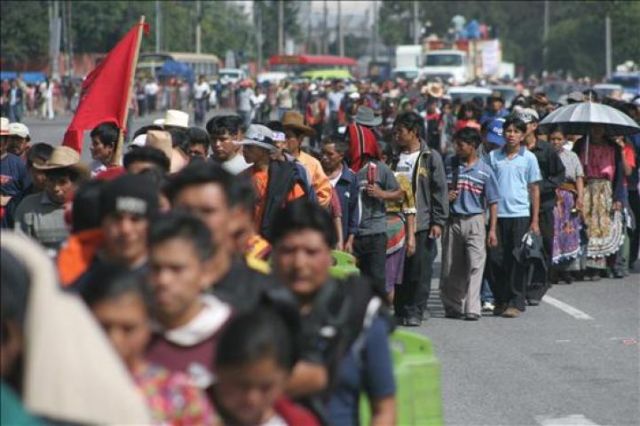
Since October, dozens of social leaders have been shot and eight killed in the struggle between Spanish-based oil and gas multinational Union Fenosa and communities in the west of the country.
On October 24, Victor Galvez was shot 32 times as he left his office, where he was meeting with neighbours whose electricity supply had been cut off by one of Union Fenosa’s subsidiaries.
Opposition to Union Fenosa began with the privatisation of electricity supply in 1999, with the multinational as the main beneficiary.
On July 8, 2009, a letter from 30 organisations, social movements, unions and Spanish political parties denounced the multinational’s practices in Guatemala.
The document highlighted “inflated charges” and “cuts to electricity supply in retaliation against those communities that protested the high rates and poor quality of the service”.
Several communities organised a boycott on paying the inflated prices. They demanded the the nationalisation of the energy sector.
Union Fenosa cut off their electricity supply on December 15.
The National Front of Struggle for the Defense of Public Services and Natural Resources (FNL) said: “After a week without power, the communities were left without water or sanitation and seriously exposed to the risk of infectious diseases.”
In response, the communities blockaded the roads connecting Guatemala and Mexico. On December 22, President Alvaro Colom declared a state of emergency in the province of San Marcos.
Still in force, it suspended most civil liberties. The provision for a state of emergency, intended to last 15 days, has now been extended six times.
“Of the eight popular leaders who have been assassinated, seven died under the legal framework of the state of emergency”, said FNL official Roberto Madriz. “The people cannot unite to make themselves heard because it is a crime for more than three people to meet together.
“Hitmen from the cocaine cartels are holding villages to ransom, telling them: ‘Pay us or be killed’.
“The day after the state of emergency was decreed, Union Fenosa opened its offices in the same building from which the region’s cocaine don operates … This was intended to send a clear message to the people.”
UDEFE-GUA, a human rights organisation, said the state of emergency can only be understood “as a means for the state to resolve the electricity supply ‘problem’ in the province and to allow … Union Fenosa to maintain control of its business”.
On January 13, anti-Union Fenosa activist Evelinda Ramirez was killed when her car was fired on from a truck with tinted windows. She was killed, two of her companions were wounded, while a fourth passenger is missing, presumed dead.
On January 29, Council Workers’ Union leader Pedro Garcia, who campaigned for energy nationalisation, was assassinated.
A similar end awaited Octavio Roblero, a leader in of the struggle in San Marcos to nationalise the energy sector and expel Union Fenosa. On 17 February, he was machine-gunned from a passing car.
On March 21, three community leaders in Ocos fighting for free access to drinking water and Union Fenosa’s expulsion were “savagely murdered with bullets and machetes”, a joint statement by FNL, Agrarian Platform and the Mexican NGO Ceiba said.
On March 22, in the town of Las Brisas, energy nationalisation activist Santiago Gamboa was killed. That morning, 10 Union Fenosa employees were sent to disconnect the town’s electricity but community members captured them.
The government sent 250 soldiers in order to “rescue those kidnapped by a mob”. The soldiers opened fire, killing Gamboa.
[Abridged from El Diagonal. Translated by Christian Tym]